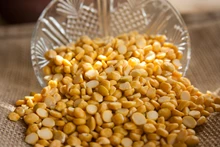
Downy mildew is a disease caused by fungus-like organisms (Oomycetes) and is spread by airborne spores, thriving in wet weather conditions. The disease poses significant challenges to a wide range of agricultural crops, including cauliflower, muskmelon, grapes, maize, sorghum, and pearl millet. Common symptoms of the disease include discolored blotches ranging from pale green to yellow, purple, or brown on the upper surface of the leaves. Meanwhile, the underside of the leaf may develop a mold-like growth, appearing white, grey, or purple. In severe cases, affected leaves may shrivel, change color, and prematurely fall off, leading to stunted growth or even plant death. Let's take a look at the management practices for downy mildew in different crops.
Cauliflower
Cauliflower is susceptible to downy mildew caused by Peronospora parasitica, which can render the curds unmarketable due to superficial discolored spots. To combat this disease, farmers can treat seeds with Metalaxyl (Apron) at a rate of 6g/kg to protect seedlings. Additionally, foliar sprays of Metalaxyl (Ridomil) at 0.4% concentration effectively control the disease during growth. These preventive measures ensure a healthy yield of marketable cauliflower.
Muskmelon
Muskmelon crops are highly susceptible to downy mildew, which manifests as yellow lesions on leaves and grayish fungal growth. This disease can cause substantial damage, affecting both yield and quality. To combat downy mildew in muskmelons, farmers should prioritize cultural practices such as crop rotation, transplanting, and proper sanitation. Additionally, timely fungicidal sprays with recommended products like Indofil M-45 are essential for effective disease control.
Grapes
Grapes are particularly vulnerable to downy mildew caused by Plasmopara viticola. Symptoms include pale yellow spots on leaves, leading to rotting and premature dropping of berries. Cultural practices such as proper pruning and sanitation are crucial for disease prevention. Furthermore, fungicidal treatments with Bordeaux Mixture and biological controls like Erwinia herbicola can help manage downy mildew effectively in grapevines.
Maize and Sorghum
Maize and sorghum crops are susceptible to downy mildew caused by Peronosclerospora sorghi and Sclerophthora macrospora, respectively. Symptoms include chlorosis, stunted growth, and excessive tillering. Effective management strategies involve crop rotation, seed treatment, and foliar sprays with metalaxyl-mancozeb mixtures. Farmers should also focus on soil health and drainage to minimize disease risk.
Pearl Millet (Cumbu)
Pearl millet, also known as Cumbu, faces downy mildew challenges, resulting in chlorosis and stunted growth. Utilizing resistant varieties and implementing fungicidal sprays with Metalaxyl + Mancozeb are key management tactics. Proper irrigation and weed control practices can also contribute to disease prevention in pearl millet crops.
Downy mildew poses a significant threat to agricultural crops, but with proactive management strategies such as using resistant varieties, cultural practices, and fungicidal treatments, farmers can mitigate its impact and ensure the health and productivity of their crops. By implementing these tailored solutions and staying informed about emerging disease threats, farmers can contribute to sustainable agricultural practices and ensure food security for future generations.











